
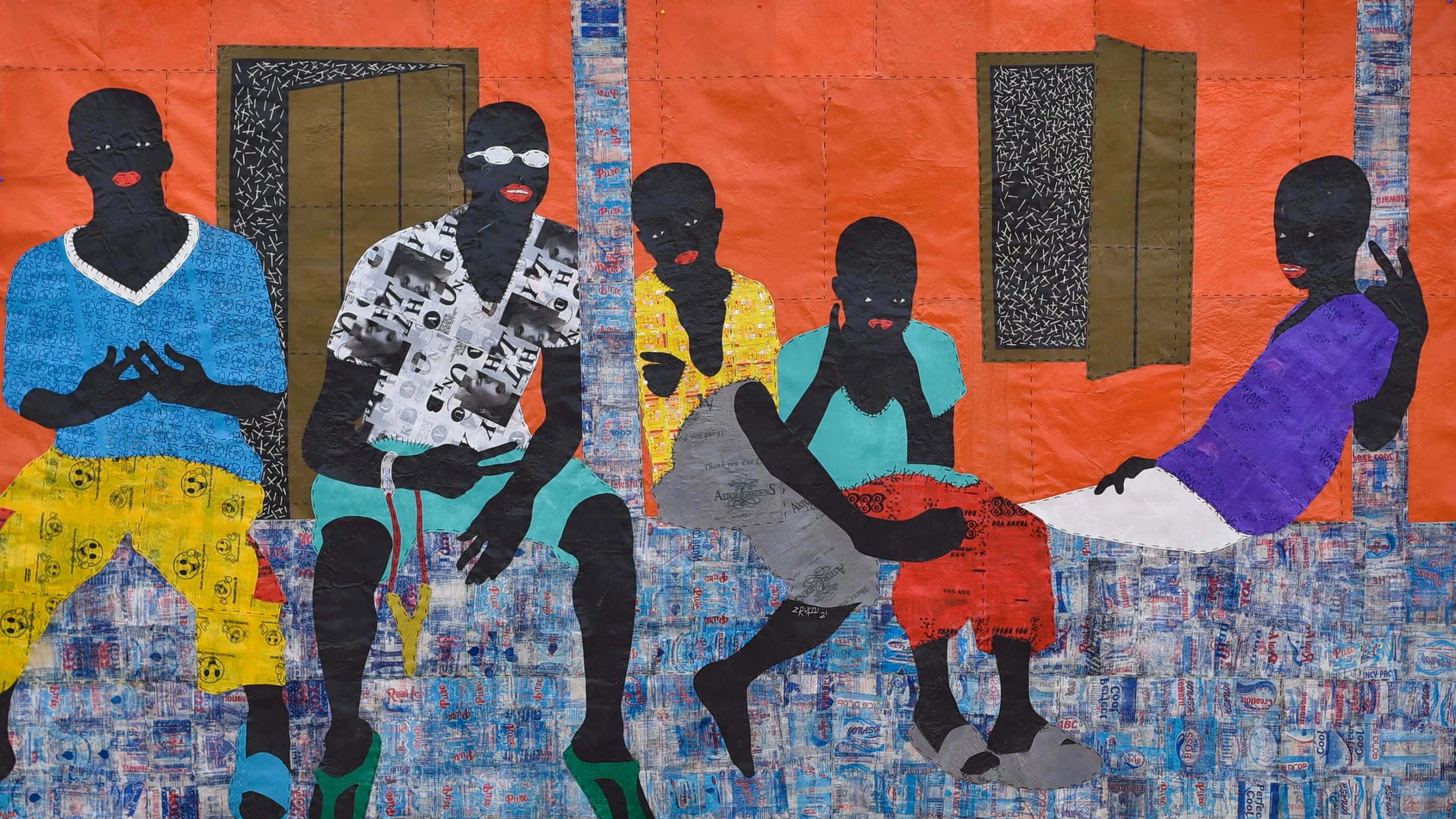
As a child, Rufai Zakari Jabre and his friends would roam the streets of Bawku, Ghana, looking for plastic bags and food packages that had been tossed out. They would sit together and build toys and sculptures using their winnings. Now, years later, Rufai has built an entire artistic career from that same premise—using solely recycled materials to create beautiful work. He tells Ugonna-Ora Owoh why the message of sustainability is so close to his heart.
In an era defined by calls to reduce our carbon footprint and slow the march of climate change, a new wave of artists are choosing a didactic approach to spreading the message of sustainability. Rufai Zakari Jabre is one such example—the basis of the Ghanaian artist’s practice is his use of recycled plastics and synthetic items to create his work, as he attempts to address the environmental issues, both local and global, that we’re facing. His works, in all their vibrant colors, are intended to illuminate the topics he’s always wanted to discuss—industrialization, consumerism, pollution, and climate change.


I didn’t just want to paint, I wanted to talk about the issues affecting my community.
Growing up in Bawku, a town in the north of Ghana, Zakari became acquainted with recycled materials from a young age. He’d join his peers searching for empty milk tins and plastics, which they would use to invent toy cars and sculptures. “Once we’d gathered all the materials, we would sit in circles and make toys, and it was so fun because we were just driven by passion,” he recalls. “We didn’t think we would make money out of it. To us, it was a hobby, something we enjoyed doing.”
It wasn’t until he moved to Nima, a Muslim community in Accra, that a more fully-fledged interest in art took hold. After junior high school, he began an apprenticeship with Hashim Hussein or Mozzay, one of the oldest artists in Nima, who heavily inspired his processes, and his journey continued at the Ghanatta college of art where he majored in painting.
“I didn’t paint for a year after graduating from college because I wanted to become financially stable first,” Zakari says. “When I returned to it, my practice changed because I didn’t just want to paint, I wanted to talk about the issues affecting my community. So, in pursuit of that, I had to leave my studio and move to the streets. I started as a graffiti artist, using my art to talk about social issues like sanitation and the environment.”
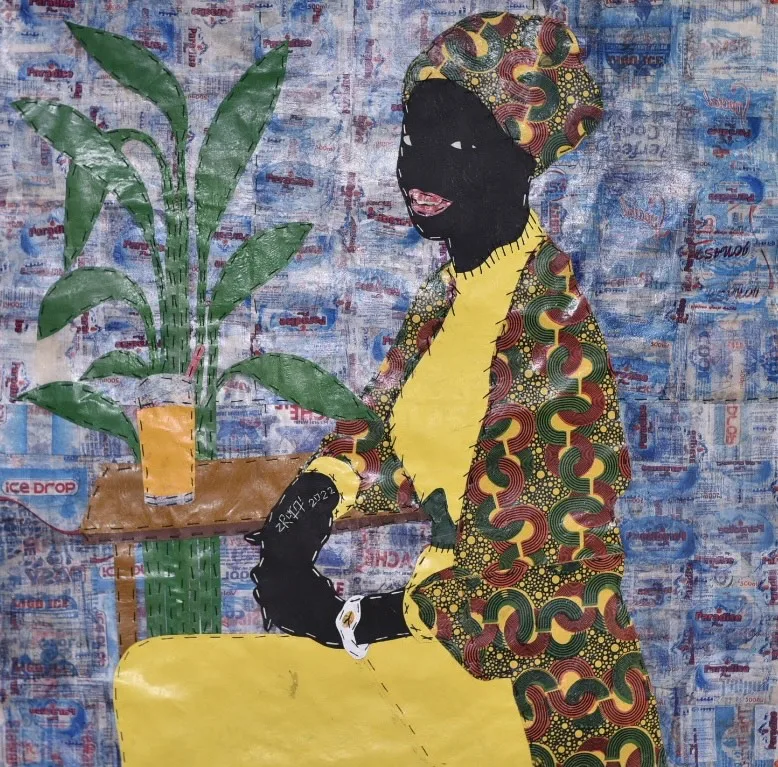
Zakari’s artistic process is inspired by his goal to keep the environment from destructive systemic industrialization. He felt that by incorporating recycled plastics and waste into his work as an artist, it would advocate for the environment and the many ways we endanger it through our irresponsible consumerism and careless waste mismanagement.
“Ghana has a very poor waste management system,” says Zakari. “You see littering in every city and community; the problem isn’t that we use plastics, but rather what we do with them once we’ve used them. It’s important we recycle them, make something good out of them, get creative with them.”
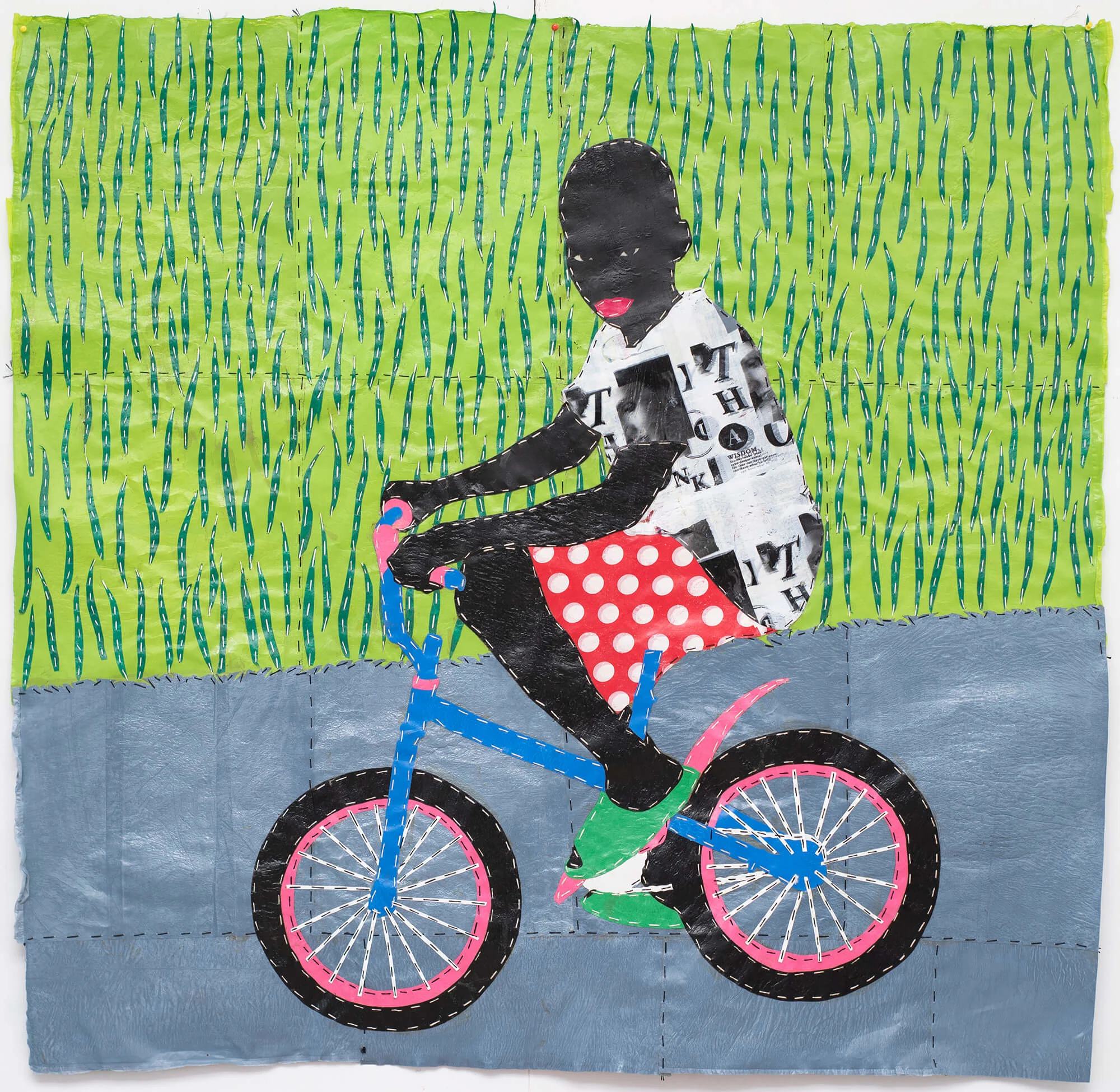
Zakari collects the materials before washing, cutting and drying them, and then they are processed into a heat-pressing machine. “In the beginning, I used to do all this myself with the help of my wife and my parents, but now, thanks to the success of the work, I’ve employed people who take on every step of this process,” he says.
From this compressed material, a collage is made. He’ll make a sketch on paper, carefully carving each stretch of material into the shape he wants it to take before placing it on the plastic and pinning it down, and then he slowly begins to thread and glue piece after piece and color after color until a story comes together.
Most of Zakari’s works depict women, striking powerful poses and dressed in luxurious, colorful gowns. He’s often seen that women in Ghana aren’t given the flowers they deserve. “I started making art about women because I feel they’re always undermined in our society,” says Zakari. “So I made it my goal to use my work to highlight these women, their efforts and give them the praise they deserve.” Just as he aims to show, through his media and processes, the possibilities when it comes to recycling, he means to show his respect for the women in his community through their carefree, confident poses and regal outfits.
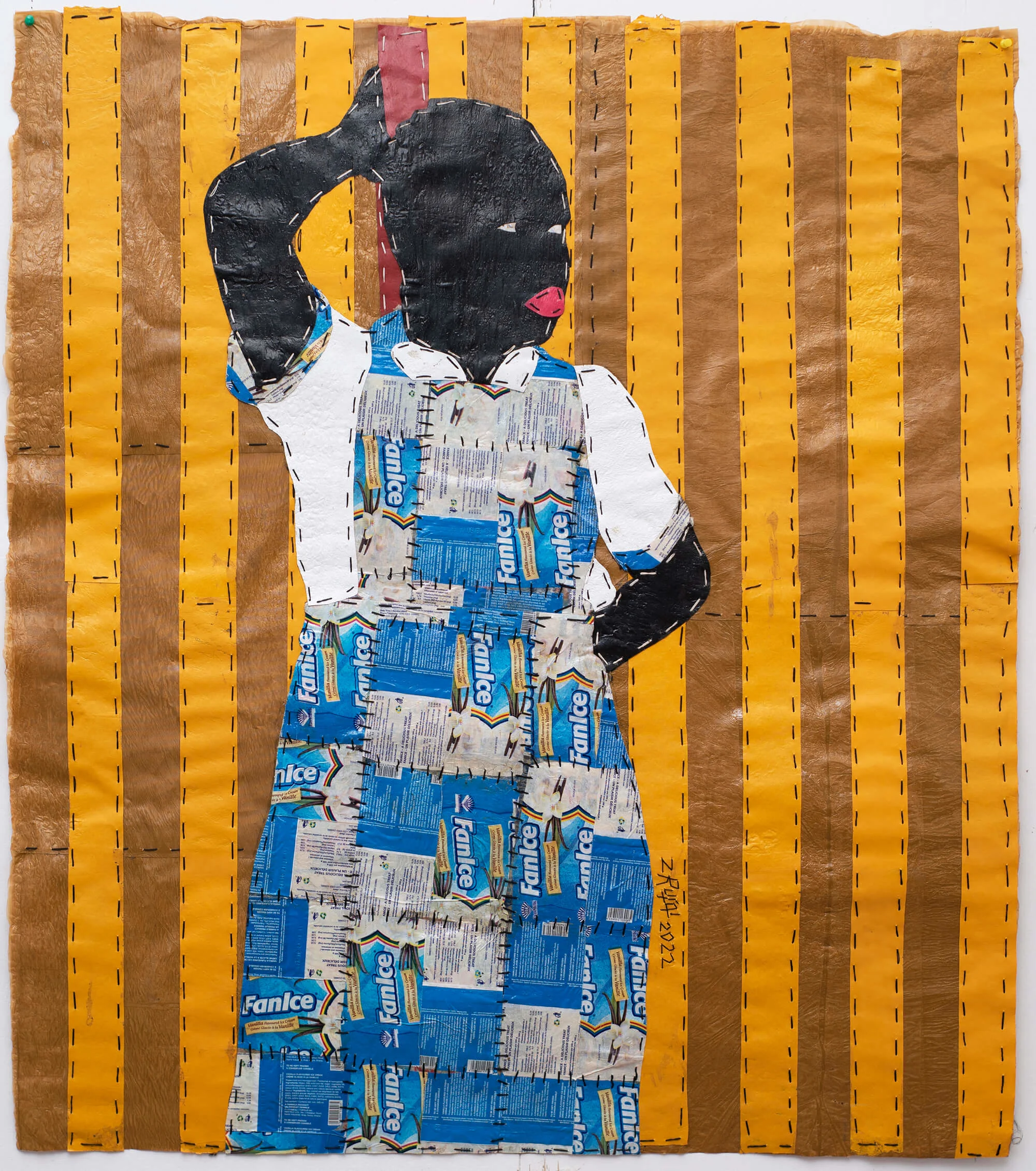
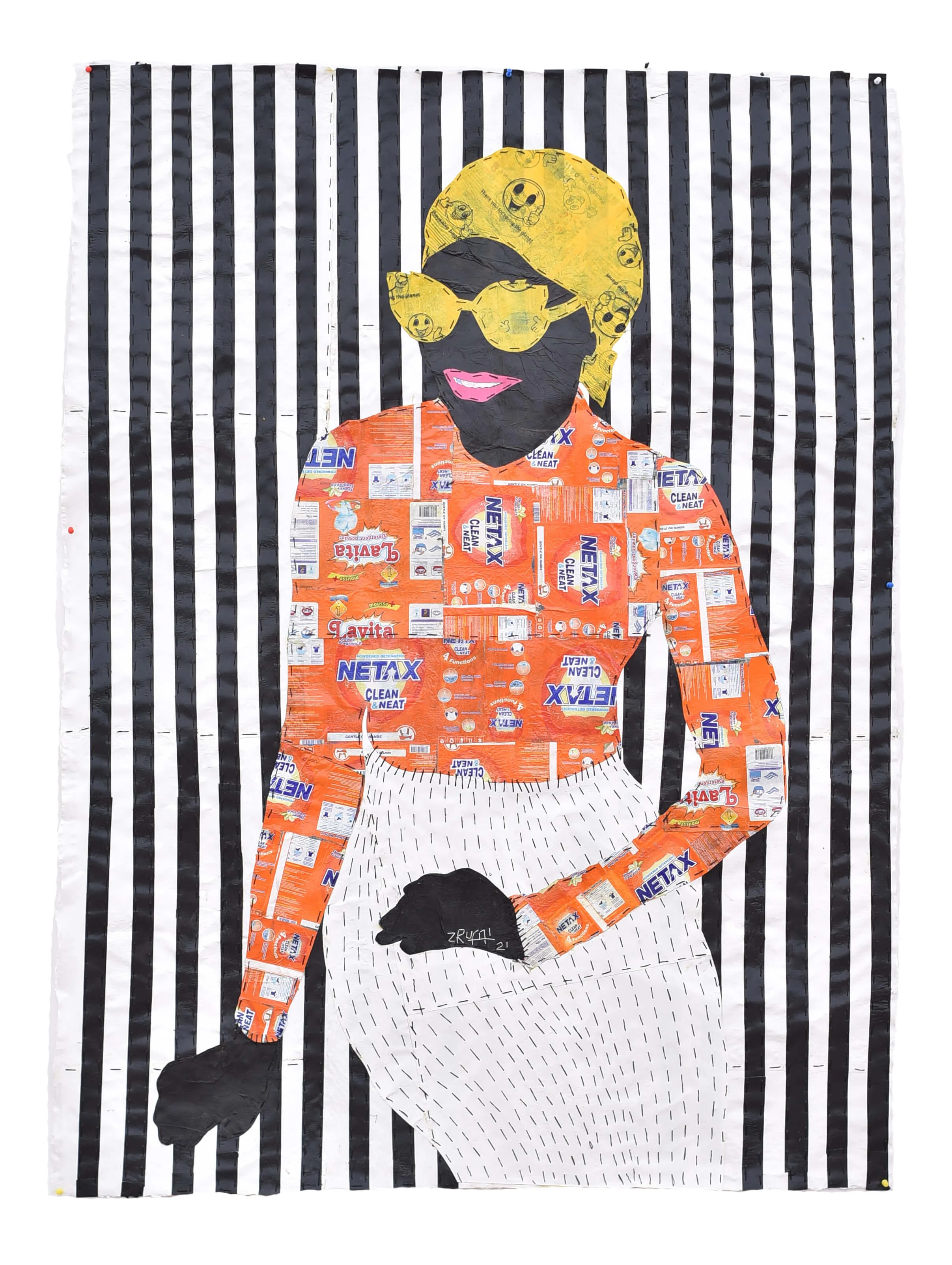
Zakari also works as an environmental activist, being the creative director of two NGOs which are championing beach cleanups, and offering educational workshops to schools, religious institutions and other communities on waste management and climate change. “The workshops are normally centered around how to be creative with waste, which is where I normally come in. I teach them why and how they could make things out of plastic bottles,” he says. “In the past, we’ve made bins and even designed bags and pencil holders.”
So much of Zakari’s daily life is already dedicated to spreading a positive environmental message, and with each artwork he creates he’s showing firsthand what treasures can be made from another’s “trash.”


